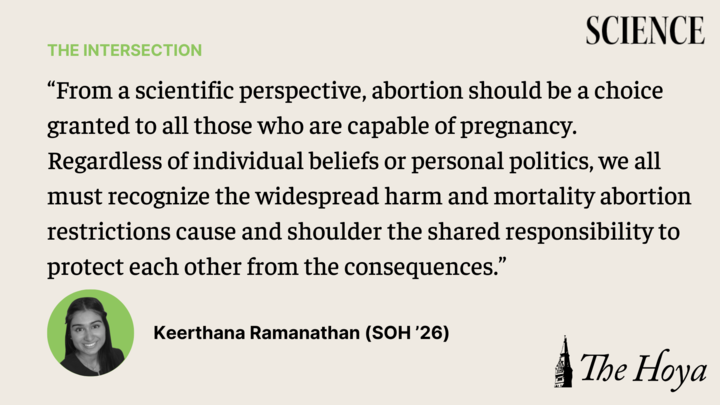Dobbs v. Jackson Women’s Health Organization, a landmark Supreme Court case decided in June 2022, redefined — and overturned — the idea of reproductive bodily autonomy.
Abortion restrictions in 24 states have been enacted since the Dobbs decision overturned the 1973 Roe v. Wade decision, which enshrined a constitutional right to an abortion. This includes the April 7 order issued by a District Court Judge Matthew Kacsmaryk in Texas that could suspend the use of one of the most widely used drugs for medication abortions, a decision that could represent the most significant restriction on abortion rights since the Supreme Court decision last summer.
In addition to being an outright attack on the bodies of those who can get pregnant, abortion restrictions directly contradict data about the benefits and risks of pregnancies, representing the deeply politicized nature of what should be a purely medical health intervention. From a scientific perspective, abortion should be a choice granted to all those who are capable of pregnancy. Regardless of individual beliefs or personal politics, we all must recognize the widespread harm and mortality abortion restrictions cause and shoulder the shared responsibility to protect each other from the consequences.
The World Health Organization attests that comprehensive abortion care is an essential healthcare service and says denying people abortion care and access can have catastrophic effects.
According to a 2009 study published in “Reviews of Obstetrics and Gynecology,” nearly half of the yearly 42 million people who choose to have an abortion turn to untrained individuals lacking the necessary skills or an environment that does not follow the minimal medical standards because of a lack of access to safe services.
Some 68,000 people die from unsafe abortions each year, making unsafe abortions one of the leading causes of maternal mortality.
A common argument put forth by anti-abortion rights legislators is that abortion harms those who choose to end their pregnancy. However, a recent landmark study conducted by Diana Foster of the University of California, San Francisco found that people denied abortions are more likely to experience negative socioeconomic, physical health and mental health outcomes than those who were freely allowed to choose to do so.
Moreover, there is profound inequity in the consequences of abortion restrictions, as clearly seen in Mississippi. Michele Goodwin, a chancellor’s professor of law at the University of California, Irvine, where she directs the Center for Biotechnology and Global Health Policy, found that a Black person is 118 times more likely to die from carrying a pregnancy to term in Mississippi, a state with one of the most restrictive abortion bans, than they are from having a legal abortion.
Many states also have laws restricting abortions to certain gestational periods, limiting abortions to the early stages of pregnancy. However, the genetic and biological complications associated with the dangers of pregnancy are numerous and variable, differing from person to person and pregnancy to pregnancy. Setting limits on abortions goes against the basic workings of science, as cardiac and renal complications could create the need for a life-saving abortion at any point in a pregnancy.
Furthermore, one of the most important but often neglected aspects of the study of abortion services is the inequality of access to it. Restrictions on bodily autonomy have long been used as a method of oppression to control minority and underprivileged communities. Reproductive injustice has long been intertwined with American history and structural inequality. During the Jim Crow era, eugenic depopulation policies and sterilization laws forced as many as 70,000 people into non-consensual sterilization, galvanizing disparities in maternal mortality. Estimates suggest that abortion bans can result in a 21% overall increase in maternal mortality, and by 33% in non-Hispanic Black Americans.
Laws and legislation that force people to carry out a pregnancy to full-term strip them of political and social choosing power, which, in turn, can also make women more financially dependent on men. Abortion restrictions also reinforce and uphold dangerous cycles of poverty, resulting in the continuation of poor health outcomes in people who are forced to have children when they do not want to or are not able to support those children.
The states with the most restrictive abortion bans also have relatively worse social safety nets, higher maternal mortality rates, and more significant disparities in health care across race and socioeconomic status.
At the end of the day, access to abortion is supported by pillars of science and fundamental respect for human dignity and equality. Everyone should have access to it — point blank.









